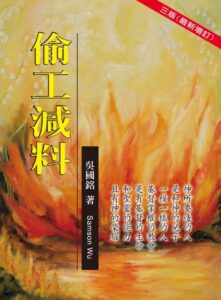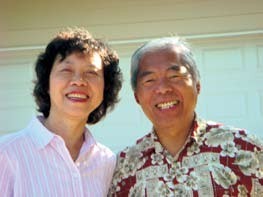
偷工減料電子書繁

吳國銘牧師 簡介
1978年蒙恩得救,1984年神告訴我要憑信心生活並顯明幫助立穩教會的根基。
1999年9月在聖靈的帶領下成立蒙愛的教會,2002年神顯明建造颱風眼教會(榮耀末世教會)的呼召,2005年11月由加州洛杉磯遷往美國密蘇里州堪撒斯市(KansasCity)等候尋求神,對建造榮耀末世教會有較深入的開啟。又因國際禱告之家(IHOPKC)24小時的禱告敬拜環境,聖靈做了多層面生命紮根和潔淨的工作,並於聖靈的引導下完成《偷工減料》一書,歷經約九年之久,終於2010年8月在台灣出版。然後設立蒙愛教會活動講台。接著被聖靈差遣到休士頓、洛杉磯、紐約、台灣、香港、日本、中國等地傳講神的心意。這段傳遞信息期間,聖靈不斷地賜下更全備的信息,使第三版的偷工減料更趨完整。
吳牧師服事的主要內容是傳悔改和恩膏的信息,提高基督徒的異象,恢復神所要造的人,和傳遞神所要建造的教會。目的是要讓華人能肩負起將福音傳回耶路撒冷的重責大任。所到之處按著聖靈的帶領傳遞聖靈與火和聖靈恩賜與恩膏以及醫治與釋放。
(吳牧師的主要信息,人的問題與答案,隨書贈送。復興的兩個鑰匙──悔改和恩膏,及神完整的救贖計劃。這兩套MP3在以琳書房均有出售。)
目 錄
前言 9
三版序 12
為甚麼要寫這本書 15
第一章 順服神的託付 16
第二章 教會真理恢復的必要性 19
第三章 為建造榮耀末世教會鋪路 21
第四章 讓基督徒更能明白自己的屬靈位置 23
真理篇(一)恢復神所要造的人 27
第一部份 神造人 29
第一章 認識造人的神 30
第二章 神為甚麼要造人 41
第三章 神要造怎樣的人 46
第四章 人的潛能與危險 55
第五章 明白神造人計劃應有的概念 62
第二部份 人的問題 71
第六章 人問題的嚴重性 72
第七章 人問題的複雜性 82
第八章 人問題的普遍性 85
第九章 人生命改變的困難度 91
第十章 為什麼分別善惡是人類的網羅和祝福? 95
第十一章 解決人類的分別善惡是新約聖經中的核心 104
第三部份 神為人預備救恩的管道 113
第十二章 神預備救恩的全貌 114
第十三章 福音的基本內容 120
第十四章 教會要傳悔改與赦罪的道 124
第十五章 教會要傳天國的福音 135
第四部份 神恢復所要造之人的過程 141
第十六章 經過重生 142
第十七章 領受水洗靈洗 145
第十八章 得勝試探 149
第十九章 取得恩膏 152
第二十章 住在基督裡 159
第二十一章 藉著進入會幕遇見基督 164
第二十二章 住在基督裡是人類問題的答案 169
第二十三章 段落結論 175
真理篇(二)建造榮耀末世教會 177
第一部份 四福音中的教會 179
第一章 恢復教會真實意義的必要性 180
第二章 從四福音看神對建造榮耀末世教會的心意 186
第三章 四福音是建造榮耀末世教會的最高啟示 198
第四章 從四福音看建造榮耀末世教會的藍圖 213
第二部份 使徒行傳中的教會 229
第五章 使徒行傳中有兩種教會 230
第六章 建造榮耀末世教會的基本前提 236
第七章 使徒行傳中建造榮耀末世教會的啟示 241
第八章 家庭教會的探討 250
第三部份 新約書信中的教會 257
第九章 新約書信中教會的含意 258
第十章 使徒書信中顯明教會的問題 264
第十一章 認識魔鬼的詭計 272
第十二章 榮耀末世教會的焦距 280
第十三章 現今教會如何與建造榮耀末世教會接軌 288
第十四章 段落結論 305
應用篇(一)彰顯基督生命的工夫 307
第一部份 從心開始 309
第一章 讓心轉變的重要因素 310
第二章 蒙神喜悅的心 318
第三章 走出黑暗進入光明的操練 324
第二部份 由愛著手 329
第四章 認識神的愛 330
第五章 在愛中重建分別善惡的新秩序 339
第六章 在愛中建立關係 342
第三部份 進入關係 345
第七章 建立與神親密的關係 346
第八章 一體的奧秘 354
第九章 從五本智慧書看人與神關係的建立 359
第四部份 帶出生命 373
第十章 如何脫去舊人穿上新人 374
第十一章 彰顯基督生命的奧秘(1)──生死不斷地轉換 378
第十二章 彰顯基督生命的奧秘(2)──將光暗分開 381
第十三章 作新造的人 386
應用篇(二)彰顯聖靈能力的工夫 391
第一部份 從靈開始 393
第一章 認識靈的重要性 394
第二章 為甚麼要被聖靈充滿 398
第三章 為甚麼不能被聖靈充滿 403
第四章 如何領受聖靈的洗 416
第五章 說方言說預言和醫病的價值 420
第六章 被聖靈擊倒可能發生的現象與原因 433
第七章 維持與聖靈親密關係的秘訣 436
第二部份 由信著手 443
第八章 信心的兩個層次 444
第九章 認識信徒的屬靈權柄 449
第十章 信心往下紮根的工夫 460
第十一章 如何聽見神的聲音 466
第三部份 進入國度 469
第十二章 亞伯拉罕的神以撒的神雅各的神 470
第十三章 神國度的降臨 479
第十四章 蒙神揀選進入神國度的人 486
第十五章 如何才能彰顯聖靈的能力? 494
第十六章 認識聖靈 503
第十七章 聖靈彰顯的兩階段性──從靈洗到火洗 509
第十八章 基督的靈與神的靈 513
第十九章 神的靈彰顯的關鍵 517
第二十章 神的僕人使女如何釋放出聖靈的能力 522
第二十一章 段落結論 561
應用篇(三) 彰顯神榮耀的工夫 563
第一部份 從己開始 565
第一章 認識自己 566
第二章 認識神管教的手 572
第三章 認識榮耀與十字架 575
第四章 認識曠野與生命煉淨的關係 579
第五章 認識恩膏是不斷降服的報酬 583
第六章 認識分別善惡和十字架的關係 586
第二部份 由望著手 589
第七章 仰望 590
第八章 盼望 593
第九章 忍耐 597
第三部份 進入基督 599
第十章 進入基督裡的特徵 600
第十一章 兩種恩膏及其互補性 604
第十二章 恩賜與恩膏的區別 608
第十三章 恩膏的失去與恢復 613
第十四章 恩膏運行必須注意的事項 623
第十五章 在基督(恩膏)裡的服事 629
第四部份 帶出榮耀 635
第十六章 被神成全的生命 636
第十七章 彰顯神榮耀的作為 641
第十八章 在恩膏裡彰顯神榮耀的七個層次 646
第十九章 主耶穌在地上所下的工夫 650
第二十章 總結論 655
讀者的回應、後記、附錄 657
讀者的回應 658
後記:完成主的託付 669
附錄一:走出黑暗禱告實用手冊 673
附錄二:” ‘Church’ Isn’t in the New Testament ” 683
附錄二:”‘Church’ Isn’t in the New Testament”
by Lonnie Lane
Even the English language confirms that the fact that an “ecclesia” was originally a select civil body, summoned for a particular purpose. So what, then, did the writers of the New Testament mean when they used the word “ecclesia” to describe a Christian
body of people? They obviously meant a body of Believers in Messiah Yeshua
summoned by God and called out (by Him) from among the Jewish and Roman peoples to come together into a separate community under His Lordship. It meant an autonomous body of Believers under the Kingship of the Lord Yeshua. They would bow to no other king than He. They would obey the rules of the nation so long as they did not conflict with their obedience to their King. They would serve no one but the Lord. That was why these same Believers often ran into trouble with rulers, whether it be the Sanhedrin or later kings and rulers. They were arrested, crucified and martyred because they served only King Messiah and not Caesar.
Paul and Silas were accused of “turning the world (system) upside down.” (Acts 17:1-6 KJV). What was their message that made them worthy of such a declaration? Paul came to town and began proclaiming Yeshua in the temple. Here’s what then took
place: “…becoming jealous and taking along some wicked men from the market place, (some) formed a mob and set the city in an uproar; and attacking the house of Jason,
they were seeking to bring them out to the people. When they did not find them, they began dragging Jason and some brethren before the city authorities, shouting, “These
men who have upset the world have come here also” (17:1-6). What was the message
that was so enflaming? The accusation is found in the next verse: “and Jason has
welcomed them, and they all act contrary to the decrees of Caesar, saying that there is another king, Jesus” (:7).
They weren’t telling the people to start a church, find a building and a minister,
attend every weekend, and act like good “Christians.” That wouldn’t have incited the city fathers against them. No, they were announcing another King other than Caesar.
They were calling people out of the Roman system into another Kingdom — God’s
Kingdom — a Kingdom far more powerful than Caesar’s, an entirely alternative life and allegiance. A whole new identity and way of life. These would now be people who no longer looked to Caesar as their king. This would have been seen as a declaration
of war, of treason. Such is the way of the “called out ones.” Those who came to
the Lord had to understand that they were making a serious choice. But they valued an eternity with the Lord over whatever it would cost them in this life. Wow, that sure
is a different way of looking at “accepting the Lord” than most of us have ever
experienced, at least in our Western societies .
Paul and Silas weren’t “church builders” in the sense that we may have thought of them. They weren’t advocating people now find some place where they can be separate and not influence anyone around them, meeting for a few hours on the weekend and singing a few songs, hearing a message, and then going home. These men were
Kingdom builders! They were dethroning Caesar and the whole Roman governmental
structure with its Empire class structure in the minds of the people. There were no distinctions among the Believers; slaves and freemen were equal among them. That went against the whole economic base of Rome which had, at least in Rome and other
large cities, more slaves than aristocracy. Their words were freeing their hearers from the mental hold Caesar had upon them through a belief that Rome was the exalted and invincible government meant to rule the world, and that Caesar was a god, albeit among other Roman and Greek gods. (In actuality the Roman gods were the same Greek gods renamed with Roman names.)
As Paul and others taught the principles of a theocracy where God alone ruled as
benevolent but holy Sovereign, and of family values and the standards of justice and equality, all of which God gave to Israel through Moses, it was doing great damage to the foundation upon which Rome stood. This was now the Almighty one-and-only God
whom they would obey at all costs, even unto death, as their hearts responded to the
call to become citizens of Christ’s kingdom and join themselves to the “ecclesia” or community of believers who were “called out” of the political and personal status quo.
So you can see that the idea of “church” as a group of people meeting in a specific location (building) as Believers has nothing of the “otherness” of the call upon their lives as was intended by the writers of the New Testament. Neither did it
have anything to do with denominations of one group believing this but not that, which meant keeping their distance from their fellow Believers based on those differences. It
would have been heresy to even consider. They were one in Messiah — period!
Yeshua sent the Believers into the world just as His Father had sent Him.
Therefore, it would not be surprising that He told His disciples “If the world hates you, you know that it has hated Me before it hated you” (John 15:18). Now you can see why that would be so. Yeshua came against the ungodly leadership that was functioning
in the temple, men who had their own political careers and power to protect. His is “great power and the glory” (Mark 13:26) and those who wish to maintain their own power and glory must do away with those who recognize only Yeshua’s.
When William Tyndale translated the Bible into English in the sixteenth century, at the cost of his life, by the way, because it meant that “church” leaders would loose their control over the people when they would have the Scriptures, he used the word “congregation” for “ecclesia.” How come? Tyndale, and other sixteenth- century reformers did not believe the word “church” properly conveyed what the word “ecclesia” meant. They used words like “congregation,” or “governmental assembly,” etc.
When you consider that the early Believers for the first two centuries met in homes and were free in their associations with one another, we can see that to have their identity so connected with what takes place in a specific building where now